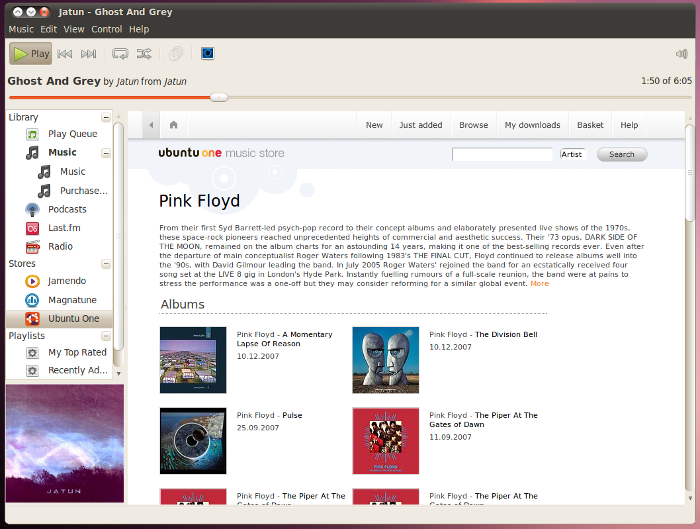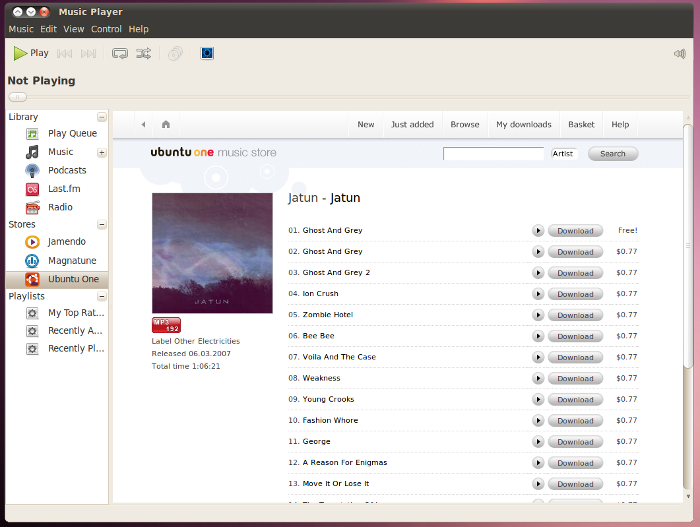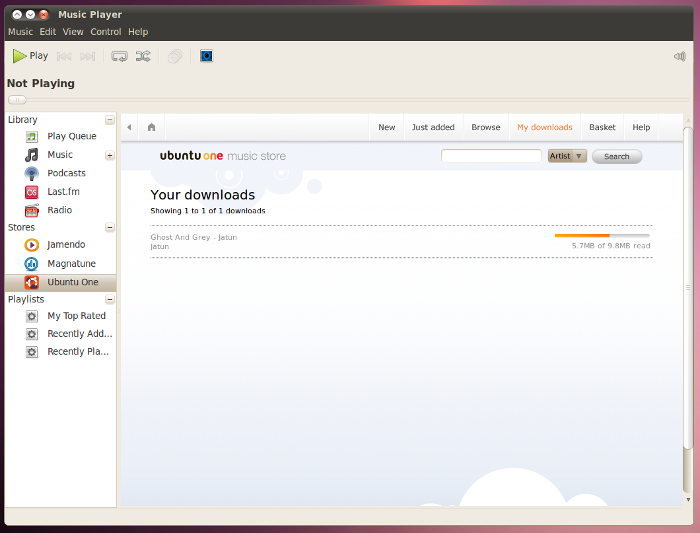Ubuntu One Music Store

Recently, Canonical, the developer of the Ubuntu Linux distribution, has announced the official launch of the Ubuntu One Music Store, which will be integrated into the Rhythmbox music player in the upcoming Ubuntu 10.04 release. The store allows users to purchase songs and albums available for download.
The store works with 7digital online music distributor, which offers more than 4 million. MP3 songs without DRM. Canonical in collaboration with 7digital developed software that allows you to store music and integrate it with Rhythmbox and Ubuntu One (a cloud service that Canonical launched last year).
Ubuntu One Music Store is available through the side navigation bar in Rhythmbox. When a user clicks on the Ubuntu One item in the sidebar, the store interface is loaded in the main area of the Rhythmbox window. The store itself is a web page that is loaded into the embedded WebKit frame. This method is different from how it is now done in Jamendo and Magnatune, where only interaction with the Rhythmbox interface is used. The WebKit method is probably the best for a rich and beautiful presentation of music production. The Music Store interface allows you to display a large number of album covers and other visual elements.
')

The main page of the Music Store shows popular and recommended songs. The user can use the element of choice of tracks by genre, as well as see the most recently added songs. There is also a search field that allows you to find a specific artist, album or track. When choosing a particular musician or musical group, you will see a description of the group along with a list of available albums, arranged in a table with the names and images of covers.

After selecting an album, you can see a list of available tracks with prices and a download button. You can buy as individual songs and the entire album. Each song also has a button for previewing a part of the song before purchase. The preview button loads the first 60 seconds of the song and loses directly into Rhythmbox.

There are several payment options, including credit cards and PayPal. 7digital controls transactions and can also save your credit card details if you wish.
The choice of music is quite decent, but not yet as wide as in iTunes or Amazon. The list of available works may vary depending on the geographic region.
There are a lot of popular artists, what the average consumer needs, but things get worse when you start looking for more specific things. Despite the gaps, there are some areas where the breadth of choice makes an impression.
Music Store is integrated with Ubuntu One in several ways. When a user buys music, it is loaded directly into the Ubuntu One cloud user space. This means that the files will be available for all user computers connected to Ubuntu One. Purchased tracks are displayed in a special section of the user's music library in Rhythmbox, the tracks themselves look just like any other music file on the user's computer.

These files are also available through the Ubuntu One web interface, which allows users to download individual files to any computer using a browser. The integration of the Music Store with the cloud is a convenient and working concept, but there is a drawback. The fact is that users who actively want to synchronize purchased music may not have enough 2Gb of space allocated in Ubuntu One. You can of course move files directly to your hard drive. You can find downloaded songs in the Ubuntu One directory under ~ / .ubuntuone / Purchased.
Music that is sold through the store is encoded in MP3 format. Although most users use MP3 encoding, since it is widely supported by third-party devices and software, this is a somewhat controversial issue for some Linux users who advocate the use of free formats, such as Ogg Vorbis. The store does not offer Vorbis encoding format and is unlikely to do so in the near future.
Ubuntu itself does not support MP3 playback by default. The user must install an additional package in order to get an MP3 codec. When a user first tries to access the Ubuntu One Music Store, they will be prompted to click a button to automatically download support for MP3 playback.
Canonical managed to make a convenient music store and integrate it well in Ubuntu. Although it is still in beta testing and is not yet completely stable. It is not clear how the income from the sale of music is distributed between Canonical and 7digital, but this mechanism will certainly allow Canonical to get some profit. Increasing the popularity of the service among users will contribute to improving the financial sustainability of Ubuntu.
Source: https://habr.com/ru/post/89183/
All Articles